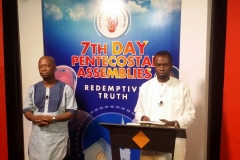Is the European Union about to Enact a Sunday Law?
By :Elder Enoch Ofori Jnr.
For hundreds of years, Biblical (Seventh-day) Sabbath believers have predicted that the observance of the Seventh Day Sabbath as a day of rest and worship will be outlawed someday and universal Sunday worship enforced by law. This belief has traditionally been based on the prophecy of Dan. 7:25:
“And he shall speak great words against the most High, and shall wear out the saints of the most High, and think to change times and laws: and they shall be given into his hand until a time and times and the dividing of time”.
Of the Ten Commandments given by God, the only law associated with time is the fourth commandment:
“Remember the Sabbath day, to keep it holy.
“Six days shalt thou labour, and do all thy work:
“But the seventh day is the Sabbath of the LORD thy God: in it thou shalt not do any work, thou, nor thy son, nor thy daughter, thy manservant, nor thy maidservant, nor thy cattle, nor thy stranger that is within thy gates:
“For in six days the LORD made heaven and earth, the sea, and all that in them is, and rested the seventh day: wherefore the LORD blessed the Sabbath day, and hallowed it” (Ex. 20:8-11).
But who does the prophecy of Daniel indicate will change God’s times and laws? It’s the “little horn” of the “fourth beast”, the Roman Empire (Dan. 7:7-8, 23-25). This ‘little horn’ represents the anti-Christian power and has historically used the state power of the fourth beast to institute and enforce the change of God’s Sabbath from Saturday to Sunday.
Constantine the Great, supposedly the first Christian Emperor of Rome, set the stage in 321 A.D. when he passed the first Sunday law for all citizens of the empire: “Let the judges and town people, and the occupation of all trades, rest on THE VENERABLE DAY OF THE SUN; but let those who are situated in the country, freely and at full liberty, attend to the business of agriculture because it often happens that no other day is fit for sowing corn and planting vines lest the critical moment being let slip, men should lose the commodities granted by heaven” (Corpus Juris Civils Cod. Liv. 3, Tit. 12; 30, Quoted in A History of the Sabbath and Sunday by John Kiesz, p. 49, capitals mine).
With this legislation, the true Sabbath-keeping Church was driven underground as she sought refuge from persecution instigated by the state church. Since then, the Seventh-day Sabbath, which is the SIGN of God’s Covenant with His people FOREVER (Ex. 31:13,16-17; Heb. 4:9), has been held up to ridicule and outlawed at the least opportunity by powers connected with the fourth beast.
Because true believers, in emulation of the Sabbath custom of Christ (Luke 4:16) and the early disciples (Acts 17:2, 13:42, 44; Heb. 4:9), continued to observe the Biblical Sabbath after Constantine’s Sunday law in 321 A.D., the Catholic Church made further legislation in the matter of Sunday observance at the Council of Laodicea in 364 A.D.: “Christians must not Judaize by resting on the Sabbath [i.e. Saturday], but must work on that day, rather honoring the Lord’s Day [supposedly Sunday], resting then as Christians. But if any shall be found to be Judaizing, let him be anathema [accursed] from Christ” (A History of the Church Councils by Charles J. Hefele, Vol. II, p. 316).
Christians who were said to be ‘Judaizing’ by observing the Sabbath are commonly branded in mainstream Christian Orthodox/Catholic literature as “Nazarenes”. But when was the term first used in the New Testament post-Resurrection era? It was a term applied to the disciples of Christ, “the Nazarene” (Matt. 2:23), by their very first enemies, the Jewish religious leaders. The apostle Paul was one, and he was an avid Sabbath keeper:
“And after five days Ananias the high priest descended with the elders, and with a certain orator named Tertullus, who informed the governor against Paul.
“And when he was called forth, Tertullus began to accuse him, saying, … we have found this man a pestilent fellow, and a mover of sedition among all the Jews throughout the world, and a ringleader of the sect of the Nazarenes” (Acts 24:1-2,5).
Historian Hugh Smith writes of the Jewish Christian sect of the Nazarenes (the true Jerusalem Church) in his book History of the Christian Church:
“The first Christian church established at Jerusalem by apostolic authority became in its doctrine and practice a model for the greater part of those founded in the first century [1 Thess. 2:13-14; Acts 15:19-21] …These Judaizing Christians were first known by the outside world as ‘Nazarenes’. … All Christians agreed in celebrating the seventh day of the week in conformity to the Jewish converts” , pp. 50,51,69).
Now the Sabbath of the ‘Nazarenes’ is on shaky ground again. A revival of the old Roman Sunday law is being proposed for the European Union, the modern successor to the same fourth beast, the Roman Empire!
The European Union is historically and culturally a resurrection of old Rome down to the geographic details. It rises principally from the ranks of the very nations into which the ‘ten-horned’ [western] Roman Empire disintegrated in 476 A.D. (Dan. 7:7; Rev. 13:1; 17:15). As Stockholm-based ‘Project 666’ propagandist Michel Smiely points out in his book Project 666, the EU’s historical and cultural heritage truly defines it as the modern “Roman Empire of the West”.
True to form, a new effort is now under way to get enacted a Sunday law that will make Sunday the official day of rest and worship across the EU. Seizing on a EU constitutional provision that allows nationals of EU member states to propose legislation on matters they deem deserving of such, a campaign has been launched and 100,000 signatures obtained in support of a petition to the European Commission, the EU’s executive body, on a proposed work-free Sunday law. (Please visit the website www.free-sunday.eu).
According to an article in the World News &Prophecy newsmagazine (www.WNPonline.org), sponsors of the EU Sunday law cite social and family benefits of a work-free Sunday yet not without a religious undercurrent. Religious groups are becoming some of the loudest advocates of the proposed legislation. At a special plenary conference organized (on March 24, 2010) by the supporters of the EU Sunday law—a coalition of labour organizations and churches—the WNP article reports that “some [of the speakers] referred to Europe’s religious heritage of Sunday as a day of rest, dating back 17 centuries to Roman Emperor Constantine and his decree supporting Sunday worship in A.D. 321. In his opening remarks, conference organizer Thomas Mann included the ‘spiritual aspect’ of life as an important part of a weekly day of rest, including attendance at worship services” (Paul Kieffer, “Always on Sunday: Europe’s official Day of Rest?” World News & Prophecy June 2010, p.7).
Europe knows its roots well. For thousands of years, sun-worship has defined its religious expression, and in 321 A.D. Constantine gave ‘the venerable day of the sun’ legal sanction. In a broad directive by the EU Council on the need for a work-free day for EU citizens, “the Council Directive from 1993 declares in Article 5 concerning a weekly work-free day: ‘Member States shall take the measures necessary to ensure that, per each seven day period, every worker is entitled to a minimum uninterrupted rest period of 24 hours plus the 11 hours’ daily rest referred to in Article 3. The minimum rest period referred to in the first subparagraph shall in principle include Sunday’” (ibid. p. 5).
Although the directive was overturned by the European Court of Justice in 1996, the concept of a work-free Sunday is so deeply ingrained in European culture to let go. It has resurfaced, and may well be the spectre of an international Sunday law to be enforced during the last rule of the antichrist .
The worship of the antichrist will entail a compulsory universal worship on Sunday—the transfer of the Sabbath from Saturday to Sunday being ‘the mark of authority’ of the apostate Mother Church to change God’s law. As spelt out in the 1985 ‘Meeting of Nairobi’, those who refuse to comply will be persecuted (Dan.7:21; Rev. 13:12-15). The ‘nonconformists’ will be the saints who keep the commandments of God, including the 7th day Sabbath, and testimony of Jesus (Rev. 12:17).



